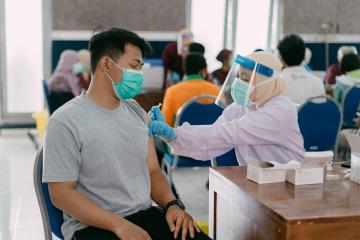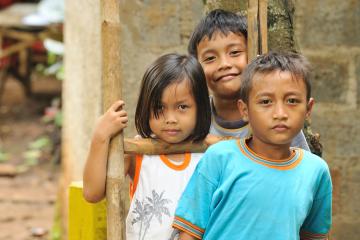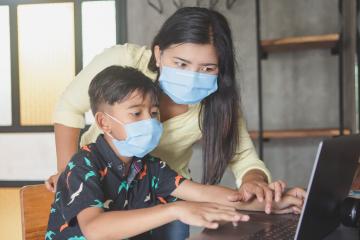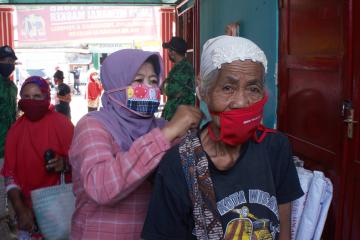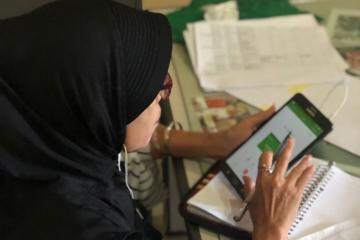Covid-19 Response at J-PAL Southeast Asia
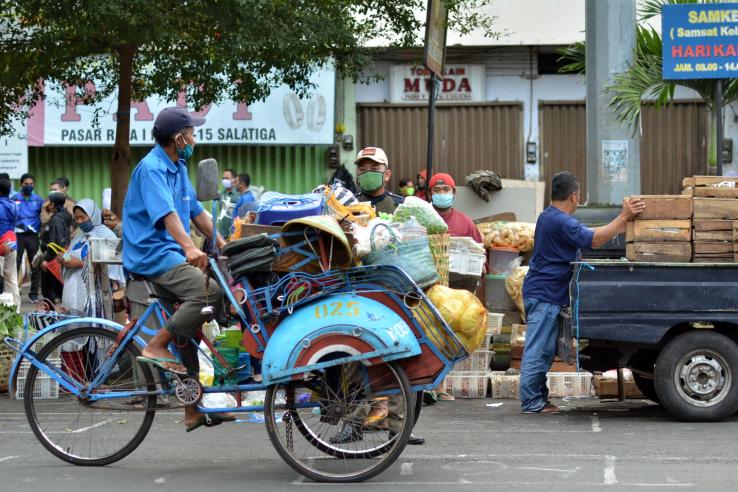
J-PAL Southeast Asia is providing timely evidence to support policy responses to the Covid-19 pandemic in Indonesia
When social distancing protocols began to take place and Covid-19 cases continued to rise in Indonesia, many government and development organizations shifted their focus and budget to mitigate the social-economic impact of the pandemic. J-PAL affiliated researchers supported this effort by collecting reliable data to understand what was happening with the lives of families and drawing on lessons learned from extensive study of social protection programs.
Evidence to Policy
Strengthening social protection in the Covid-19 era
Indonesia has massively expanded its social assistance programs to respond to the crisis. However, with more beneficiaries and a larger scale crisis, a new question arises: How can we strengthen existing institutions as a backbone to provide assistance to the crisis?
As a commitment to support the Indonesian government in mitigating the economic impact of Covid-19, J-PAL Southeast Asia (SEA) hosted a webinar on September 22, 2020, Social Protection in the Covid-19 Era: What can the evidence tell us?
Navigating Indonesia’s post-pandemic era: Addressing opportunity, inequality, and growth
J-PAL Southeast Asia organized a public webinar to provide insights into the Government of Indonesia’s policy directions and learnings from global evidence on challenges faced in health, inequality, and the environment. The webinar facilitated a conversation between Sri Mulyani Indrawati (Minister of Finance, Government of Indonesia) and Abhijit Banerjee (MIT; Director, J-PAL), and was moderated by Chatib Basri (Co-founder and Senior Partner, CReco). The discussion talked about three big issues which are vaccination coverage, policies to address Covid-induced inequalities, and a green recovery.
Research
Capturing the social-economic impact of the pandemic
J-PAL SEA Scientific Directors initiated a nationwide online survey to regularly capture the impact of the pandemic from March through November 2020 on employment, food security, migration, utilization of government programs, and health knowledge and practices. These results were shared, among others, with the National Development Planning Agency (Bappenas). This survey led to a further collaboration with the Bappenas Directorate for Alleviating Poverty to understand the impact of the pandemic specifically on beneficiaries of government programs, conducted through facilitators of the conditional cash transfer program, Program Keluarga Harapan (PKH).
To request access to this data, contact Colley Windya, cwindya@povertyactionlab.org.
Tracing mobility during the pandemic
Many policymakers were concerned about the costs of suspending economic activity due to Covid-19 lockdowns. J-PAL affiliated researchers conducted a study to determine whether economic losses are caused by the enforcement of lockdowns, or rather by people’s own behavior in response to Covid-19.
Using de-identified location data captured in smartphones obtained from the company Veraset, researchers worked with J-PAL SEA to study movement patterns to analyze how Indonesians changed their behaviors during the initial phases of Covid-19 and during the lockdown.
Use of digital financial services during the Covid-19 pandemic
To examine whether the pandemic has increased the use of digital financial services (DFS) in Indonesia, J-PAL SEA's Inclusive Financial Innovation Initiative team collaborated with an Indonesian government partner to conduct an online survey on DFS adoption. The survey found that there was an increase in use of DFS during the pandemic and that there are promising signs of inclusion among harder-to-reach groups.
The Inclusive Financial Innovation Initiative is working alongside governments, private sector firms, and nonprofit organizations to understand how the Covid-19 pandemic has shaped the way people live and transact.
Examining the implementation of home learning in Jakarta
In response to the Covid-19 outbreak, Jakarta’s provincial government stopped all classroom learning. Home learning supplanted learning activities at schools. The quick transition process from normal school activities to home learning raises questions about the readiness of teachers, parents, and students for teaching and learning effectively from home. Against this background, J-PAL SEA, in collaboration with Jakarta’s Provincial Government and the DKI Jakarta Provincial Education Department, conducted an exploratory study to examine the implementation of home learning in DKI Jakarta.
Gender based-violence during the pandemic
In partnership with the United Nations Development Programme (UNDP) and in collaboration with Kapal Perempuan and Komnas Perempuan, researchers conducted online surveys and phone interviews with both men and women to analyze the consequences of Covid-19 pandemic on unpaid-care work and gender-based violence.
Featured Content
Media
Basri, C. Rema Hanna, Benjamin Olken. Insight: Don’t forget the middle class in social protection programs. Jakarta Post, 16 April 2020.
Hanna, R. and Benjamin Olken. Cushioning the Poor from Covid-19 Shock. Project Syndicate, 15 April 2020.
Hanna, R. Expansion of Social Protection to Lower Middle Class. Kompas, 22 April 2020.
Olken, B. Designing the Assistance Program for the Lower Middle Class. Kompas, 23 April 2020.
VoxDev Podcast with Rema Hanna and Benjamin Olken: How can we best protect the most vulnerable in the developing world during the Covid-19 pandemic?
